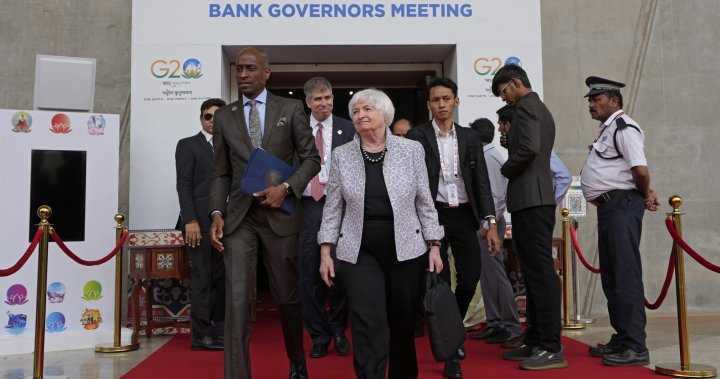
G20 finance ministers end India meeting without consensus on Ukraine war
Global News
Following two days of talks, there was no final communique. Instead, India, as the host nation, was forced to issue the G20 Chair's summary and an outcome document.
A meeting of finance chiefs and central bank governors of the Group of 20 leading economies ended on Tuesday in India without a consensus because of differences between countries over the war in Ukraine.
Following two days of talks, there was no final communique. Instead, India, as the host nation, was forced to issue the G20 Chair’s summary and an outcome document.
Speaking to reporters after the meeting concluded in Gandhinagar, a city in the western state of Gujarat, India’s finance minister said the reason for the chair statement was “because we still don’t have a common language on the Russia-Ukraine war”.
Nirmala Sitharaman said that the language describing the war had been drawn directly from last year’s G20 leaders summit declaration in Indonesia. “We don’t have the mandate to change that,” she said, adding that this was something the leaders would have to decide when they gather in the capital, New Delhi, for the main summit in September.
According to the chair summary, China and Russia objected to paragraphs referring to the war which said it was causing “immense human suffering” and “exacerbating existing fragilities in the global economy”. The wording was taken from the previous declaration in Indonesia, where leaders had strongly condemned the war.
Similarly in February and March, when India hosted G20 finance chiefs and foreign ministers, objections from Russia and China meant that India had to issue a chair’s summary.
Food security was a key priority, Sitharaman said. Members raised Russia’s move Monday to halt the deal that allowed grain to flow from Ukraine via the Black Sea to parts of Africa, the Middle East and Asia where high food prices have pushed more people into poverty.
“It is in that context today that several members condemned it, saying it shouldn’t have happened. Food passing through the Black Sea shouldn’t have been stopped or suspended,” she told reporters.

 Run 3 Space | Play Space Running Game
Run 3 Space | Play Space Running Game
 Traffic Jam 3D | Online Racing Game
Traffic Jam 3D | Online Racing Game
 Duck Hunt | Play Old Classic Game
Duck Hunt | Play Old Classic Game